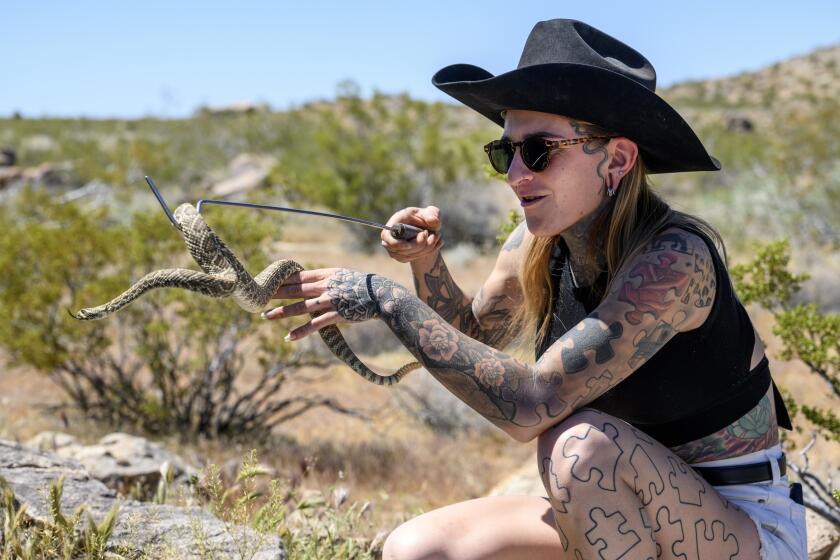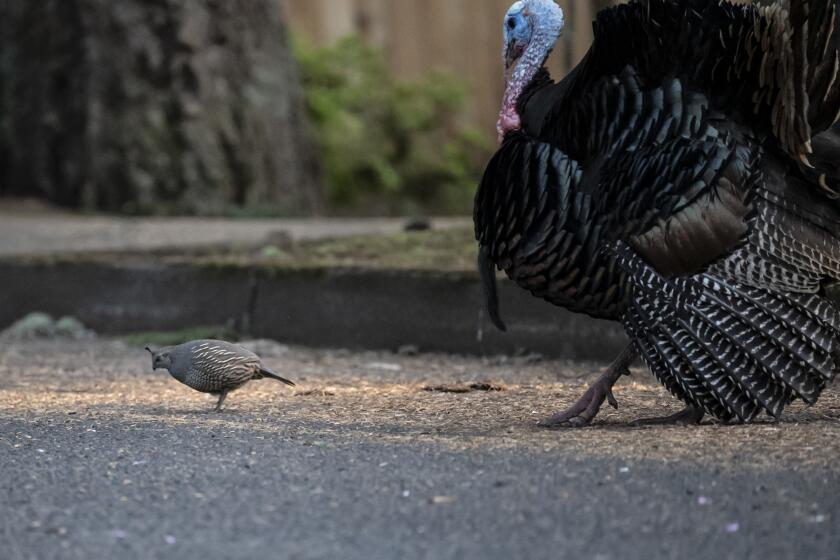Ecological issues unite Israeli and Jordanian farmers
For years, Ibrahim Alayyan watched in frustration as rats devoured the date palms at his lush family farm.
Having no luck with pesticides, the retired heart surgeon was only too eager to try a pest control agent widely used in fields just across the Jordan River in Israel -- owls.
“There used to be so many rats,” Alayyan said. “But after we put in the owls, thank God, this is the first time we have had a full date harvest.”
To the world, the symbol of peace may be a dove, but to farmers on either side of the Jordan, it’s the common barn owl.
Alayyan is one of dozens of Jordanians working with Israelis to fight rodents with a natural predator instead of chemicals.
The effort faces suspicions and superstitions, but organizers hope news of their partial success will spread to Lebanon, Syria and other countries in the region, demonstrating the fruits of the 1994 peace treaty that ended a 46-year state of war between Israel and Jordan.
Political benefits aside, the project is driven foremost by environmental concerns.
In the late 1970s, chemicals killed hundreds of birds in northern Israel, said Yossi Leshem, an Israeli ornithologist and director of the International Center for the Study of Bird Migration.
So Leshem persuaded Sde Eliyahu, a kibbutz south of the Sea of Galilee, to try owls, which can eat as many as 10 rodents a day. All the farmers needed to do was build boxes where the birds could raise their young.
“I put up 14 barn owl boxes, and everybody laughed at me,” said Shauli Aviel, who oversees the effort at the collective farm.
A few years later, Sde Eliyahu’s rat problem had vanished, he said. More than 60 nesting boxes now sit on the grounds of the kibbutz, and the technique has caught on with other farmers along the Jordan River.
As the owl population grew, the birds began flying across the border to Jordan, where pesticide use is rampant. Chemicals seeped into the water table, and the owls were poisoned by eating contaminated rodents.
Then came the peace treaty, Israelis and Jordanians got used to being good neighbors, and in late 2002 Aviel and other Israeli farmers planned a regional conference on barn owls to explain their advantages.
The response was discouraging. Many Arabs consider owls as bad luck. Word came that no Jordanians would attend.
So the organizers changed the title of the conference to focus on organic farming, and two dozen Jordanians came. Midway through, they were given a demonstration on owls, and soon Jordanian farmers were asking how they could attract owls to their fields, Aviel said.
With funding from the Jewish Community Federation of Cleveland, Ohio, the kibbutz gave the Jordanians advice and materials. More than three dozen nesting boxes have since been put up in Jordan, organizers said.
Among the most eager participants was Alayyan, former chief of cardiovascular surgery at a Jordanian hospital. He agreed to build a nesting box at his farm in the village of Sheik Hussein, six miles from Aviel’s kibbutz.
“For me, it was a real pleasure to find a man like that on the other side of the border,” said Aviel, as he and Alayyan surveyed a group of owl nestlings. Unable to communicate in their own languages, the two men spoke to each other in English, but when it came to nature and conservation, “He spoke in my language,” Aviel said.
The project also has received support from political and former military leaders in both countries, including Mansour abu Rashed, the former head of Jordanian intelligence.
Rashed, who heads the Amman Center for Peace and Development, said organizers were “under no illusions” that the owl project would ease Mideast tensions; the goal was simply “to bring people together, to let them talk and build confidence.”
But obstacles remain. After the U.S.-led invasion of Iraq in March 2003, Israeli farmers delayed the initial delivery of building materials to Jordan for the owl boxes because of the tense atmosphere. Arabic posters promoting the benefits of barn owls make no mention of Israel.
Even when tensions run high, the environment is one of the few areas where Israelis and Arabs cooperate. The owl conference went ahead at a time when the Palestinian uprising against Israel was at its peak, and during that uprising, Israeli and Palestinian officials maintained contacts on issues such as water quality and waste removal.
The Arava Institute for Environmental Studies in southern Israel trains Jewish and Arab students, including Jordanians and Palestinians, in addressing ecological problems.
Friends of the Earth Middle East, an organization of Israeli, Jordanian and Palestinian environmentalists, leads joint efforts to clean up the Jordan River and promote ecotourism packages on both sides of the border.
“We’re doing something our governments are not able to do,” says Mira Edelstein, a spokeswoman for the group. “If people know how to highlight the environmental benefits that can come out of this type of cooperation, then it’s not political anymore.”
More to Read
Start your day right
Sign up for Essential California for news, features and recommendations from the L.A. Times and beyond in your inbox six days a week.
You may occasionally receive promotional content from the Los Angeles Times.






